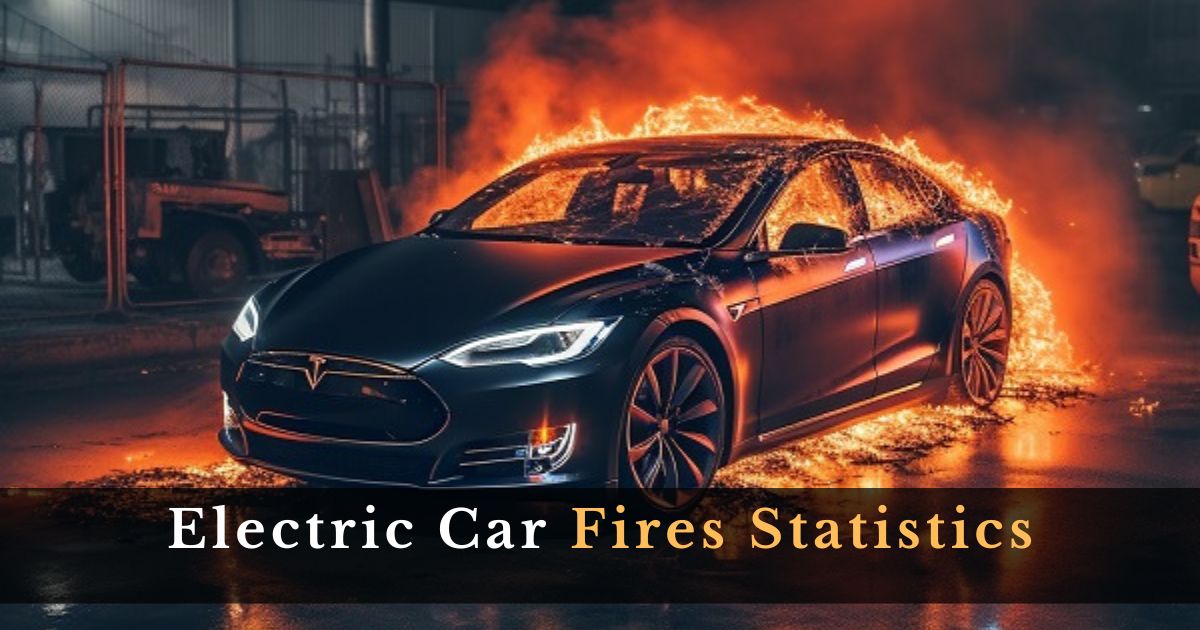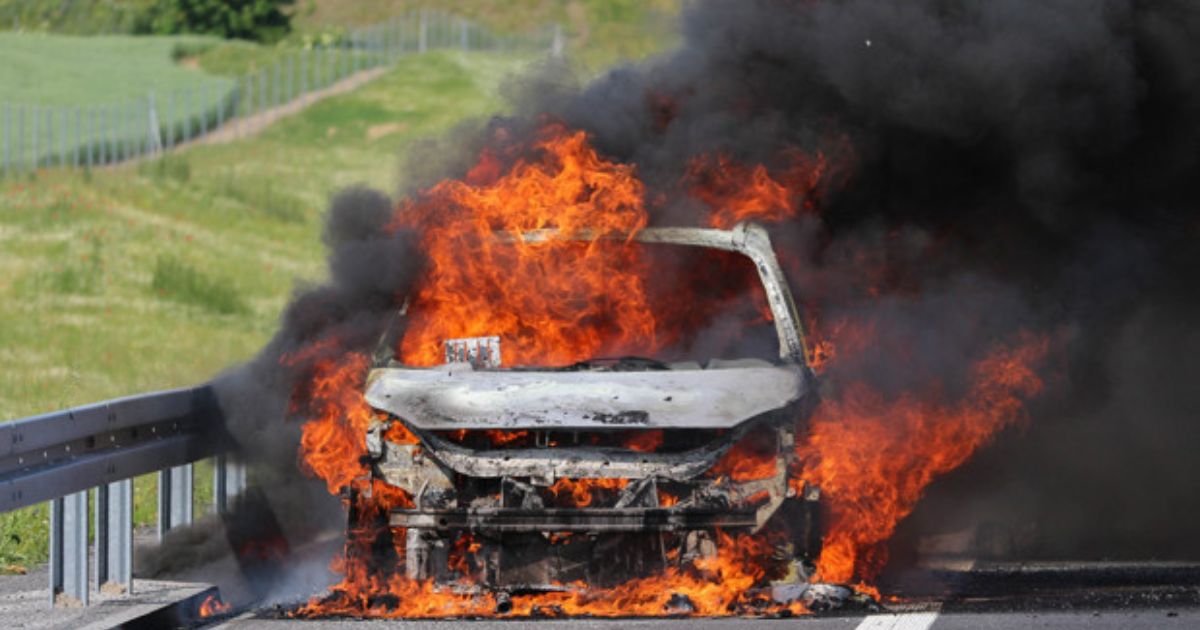Electric car fires statistics, Electric vehicles (EVs) are becoming more popular due to their environmental benefits and advancements in technology. However, one topic that often comes up is the risk of fires in electric cars. This article will provide a detailed look at the statistics and factors related to electric car fires, helping to address common concerns.
Electric Car Fires Statistics: Unpacking the Myths and Realities
Introduction
Electric cars are no longer a thing of the future—they’re here, and they’re becoming increasingly common. As we transition towards greener transportation solutions, electric cars stand out for their eco-friendly benefits and advanced technology. However, like any new technology, they come with their own set of concerns, one of the most prominent being the risk of fires. This article aims to shed light on electric car fire statistics, helping to separate myth from reality and providing a clearer understanding of the risks involved.
Understanding Electric Car Fires
So, what exactly are electric car fires, and how do they occur? Electric car fires are incidents where the vehicle’s electric battery ignites or explodes. These fires can result from several factors, including battery malfunctions, charging issues, and external impacts. Understanding these causes is crucial for both consumers and manufacturers to enhance safety measures and reduce risks.
| Category | Statistic | Year | Reference |
| Total EVs Registered | 2.4 million | 2022 |
Consumer Affairs
|
| EV Fire Rate | 0.01% | 2022 |
(Extrapolated from Sweden data)
|
| Estimated Annual EV Fires | 24 | 2022 |
(Calculated from EV registrations and fire rate)
|
| Gas-Powered Vehicle Fire Rate | 0.15% | 2018 |
CarJunkya (reference data might be older)
|
| Estimated Annual Gas Car Fires | 3,600 | 2022 |
(Extrapolated from 2018 data and total gas vehicles)
|
| Hybrid Vehicle Fire Rate | 0.35% | 2018 |
CarJunkya (reference data might be older)
|
| Fire Severity | Less | – |
Multiple Sources
|
Electric Car Fire Statistics
When we look at the numbers, car fires in general are not uncommon. According to the National Fire Protection Association (NFPA), there are roughly 152,300 car fires annually in the United States, causing around 209 deaths and 764 injuries. But how do electric cars compare? Research indicates that electric car fires are significantly less frequent than those involving internal combustion engine (ICE) vehicles. A study by Autoinsurance EZ found that electric vehicles have a 0.03% chance of catching fire, compared to 1.5% for ICE vehicles.
Causes of Electric Car Fires
Electric car fires primarily stem from battery-related issues. The lithium-ion batteries used in these cars can malfunction due to manufacturing defects, damage, or improper handling. Charging problems, such as overcharging or using incompatible chargers, can also lead to fires. External factors, including severe impacts from accidents, can damage the battery, triggering a fire.
Battery Technology and Safety Measures
Battery technology has come a long way, with manufacturers implementing numerous safety measures to mitigate fire risks. Modern electric cars are equipped with advanced battery management systems that monitor temperature, voltage, and current to prevent overheating. Additionally, automakers use robust casing and fire-resistant materials to protect the battery pack.
Notable Electric Car Fire Incidents
Despite the overall low risk, some high-profile electric car fire incidents have captured public attention. Cases like the Tesla Model S fire in 2013 and the Chevrolet Bolt EV recall in 2020 highlighted potential safety concerns. These incidents, while rare, have prompted manufacturers to take additional safety measures and conduct extensive investigations to prevent future occurrences.
Manufacturers’ Response to Electric Car Fires
In response to fire incidents, many manufacturers have issued recalls and upgraded their safety protocols. For instance, Tesla has continually updated its software to enhance battery safety, while General Motors initiated a massive recall to address potential fire risks in the Chevrolet Bolt EV. These proactive steps are crucial in maintaining consumer trust and ensuring vehicle safety.
Fire Response and Management
Handling electric car fires requires specialized knowledge and equipment. Firefighters receive training on dealing with high-voltage batteries and the unique challenges they present. Departments are increasingly equipped with tools designed for electric vehicle fires, ensuring they can manage such incidents effectively and safely.
Electric Car Fire Prevention Tips
Electric car owners can take several precautions to minimize fire risks. Regular maintenance and inspections are vital. Ensure your car’s battery is in good condition and avoid using damaged or incompatible chargers. Follow the manufacturer’s guidelines for charging and storage, and be mindful of any recalls or safety notices.
Insurance and Electric Car Fires
Insurance policies for electric cars typically cover fire damage, but the specifics can vary. It’s essential to understand your policy and whether it includes comprehensive coverage for battery-related issues. While electric cars might have higher initial premiums due to their value and repair costs, they also benefit from fewer fire incidents, which can positively impact insurance rates.
Public Perception and Media Coverage
Media coverage plays a significant role in shaping public perception of electric car safety. High-profile fire incidents often receive extensive coverage, which can amplify fears and misconceptions. It’s important to look at the broader context and understand that electric car fires are relatively rare compared to traditional vehicles.
The Future of Electric Car Safety
The future looks promising for electric car safety. Continuous research and development aim to enhance battery technology and vehicle design, reducing fire risks further. Innovations like solid-state batteries and improved thermal management systems are on the horizon, promising safer and more reliable electric vehicles.
Government Regulations and Standards
Government regulations play a critical role in ensuring electric car safety. Regulatory bodies set standards for battery manufacturing, vehicle design, and safety features. Compliance with these regulations is mandatory, and manufacturers must undergo rigorous testing to certify their vehicles’ safety.

Benefits of Electric Cars Despite Fire Risks
Despite the fire risks, electric cars offer numerous benefits. They produce zero emissions, contributing to cleaner air and a healthier environment. Electric cars also boast lower operating costs, higher efficiency, and quieter operation compared to traditional vehicles. These advantages make them a compelling choice for eco-conscious consumers.
In conclusion, while the risk of electric car fires exists, it is relatively low compared to traditional gasoline vehicles. Advances in battery technology and safety measures continue to improve, making electric cars safer than ever. By staying informed and following safety guidelines, electric car owners can enjoy the many benefits of this green technology with peace of mind.
FAQs
How common are electric car fires compared to gasoline cars?
Electric car fires are significantly less common than fires involving gasoline cars. Electric vehicles have a much lower incidence rate of fires due to their design and safety features.
What should I do if my electric car catches fire?
If your electric car catches fire, evacuate the vehicle immediately and call emergency services. Do not attempt to extinguish the fire yourself, as it may require specialized equipment.
Are newer electric cars safer than older models?
Yes, newer electric cars generally incorporate the latest safety technologies and improvements, making them safer than older models. Manufacturers continuously update designs to enhance safety.
Do electric car fires pose a greater risk to passengers?
Electric car fires do not necessarily pose a greater risk to passengers compared to traditional car fires. Modern electric cars are designed with numerous safety features to protect occupants in the event of a fire.
How can I ensure my electric car is safe?
To ensure your electric car is safe, follow the manufacturer’s maintenance and charging guidelines, keep up with regular inspections, and stay informed about any recalls or safety notices for your vehicle.






